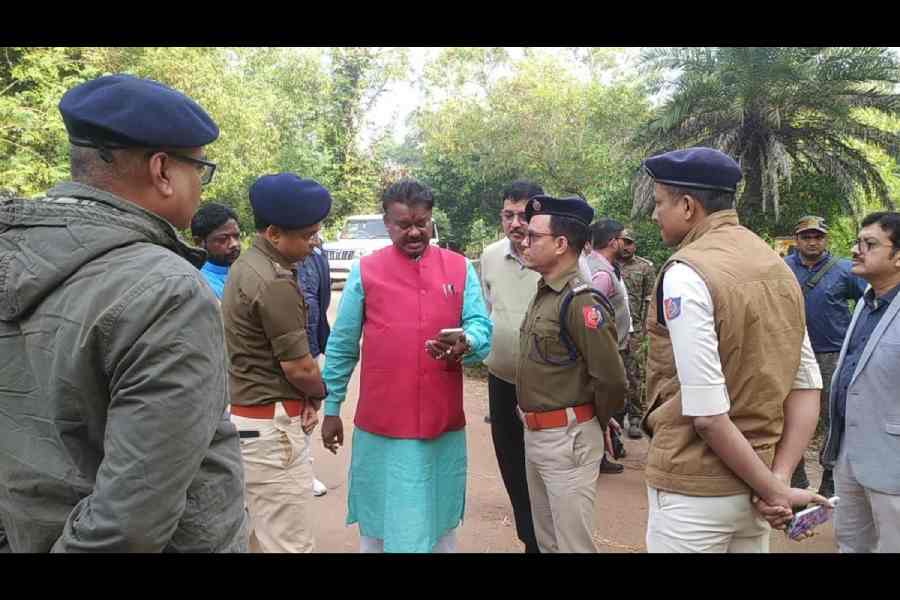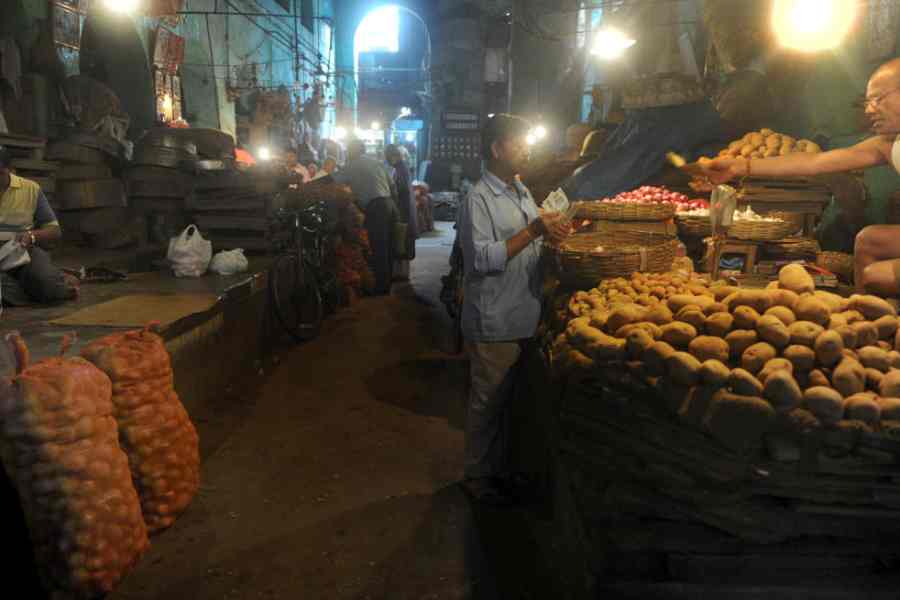The Bengal government on Thursday reaffirmed that the ban on the transport of potatoes to other states would continue, citing a limited stock of the produce.
Some neighbouring states have taken the move badly, with Odisha accusing Bengal of creating an artificial potato crisis. Bengal’s potato traders too have opposed the move claiming the state has “more than enough” stocks to meet its own demand and still supply to others.
“We have no plans to allow the movement of potatoes to other states for the time being,” Bengal agricultural marketing minister Becharam Manna said.
“We currently have a stock of around 5.7 lakh tonnes of potato, which can meet our state’s daily consumption requirement for the next 40 days, by when new produce will reach the market.”
Manna said the daily demand for potatoes in Bengal is usually about 18,000 tonnes but with plenty of green vegetables available in winter, the demand drops to 15,000 tonnes.
“We have to ensure that potato supply remains normal for the next 40 days until fresh produce reaches the market,” he added.
Manna has been regularly raiding areas on the Jharkhand and Odisha borders to ensure the ban is being enforced.
Bengal, which produces 90-120 lakh tonnes of potatoes annually, usually supplies the vegetable to at least four neighbouring states: Jharkhand, Odisha, Bihar and Assam.
The Mamata Banerjee government announced the ban on potato movement on November 28 amid a surge in the crop’s prices to ₹40-45 a kilo in the state’s markets.
On Monday, Mamata told the Assembly that potatoes would not be transported outside Bengal until the state’s own demand had been met.
Bengal’s decision has caused a sharp rise in potato prices in Odisha and Jharkhand.
The Odisha government on Thursday blamed Bengal for potato prices in the coastal state having nearly doubled in the past seven days, from about ₹30 to ₹50-60 a kilo.
Odisha food supplies and consumer welfare minister Krushna Chandra Patra accused the Mamata government of creating an artificial potato crisis to defame the BJP-led government of Mohan Charan Majhi.

Minister Becharam Manna (in red jacket) on the Bengal-Jharkhand border in Jhargram on Wednesday to check the implementation of the ban on the potato trade. Picture by Buddhadeb Bera
Despite Bengal minister Manna asserting a complete ban on potato transport outside the state, Patra told the Odisha Assembly that a fresh consignment of potatoes had recently entered Odisha from Bengal. “I have no clue why the Bengal chief minister first stopped potato transportation and later agreed to resume the supply. I have no idea why she resorted to such politics,” Patra said.
While potato traders in Odisha said the produce was continuing to sell at ₹50-60 a kg, Patra claimed potato prices had come down to “normal”. He did not clarify what he meant by “normal” price.
“There is no shortage of potatoes in the market at present. The prices will go down further in the coming days. Just wait, everything will be normal,” Patra said.
Jharkhand chief minister Hemant Soren on Sunday took cognisance of the “stopping” of Jharkhand-bound, potato-laden vehicles at Bengal’s borders, which has created a similar problem to the one in Odisha.
On a direction from Soren, the Jharkhand chief secretary spoke with her Bengal counterpart, Manoj Pant, who assured her that a committee would be formed to resolve the issue. Bengal supplies around half of Jharkhand’s potato requirements.
Traders in Jharkhand were optimistic about prices stabilising by Friday thanks to a steady supply of potatoes from Uttar Pradesh. They, however, said that consumers preferred the Bengal potato, which was of a better quality.
Potato traders in Bengal too are unhappy at the ban, arguing the state’s current stocks outstrip its own requirements.
“The current stock of potatoes is more than enough; we are trying to get the state government to understand this. Let’s see when the ban gets withdrawn,” said Laloo Mukherjee, secretary of the Paschim Banga Pragatishil Aloo Byabasayee Samiti.
The association of potato traders in Bengal began a strike and halted the release of their stocks last week in protest against the ban. But the strike was withdrawn immediately after a meeting with the state government.
“We are facing severe losses because of the ban. The minister (Manna) has assured us that he will speak to chief minister Mamata Banerjee and get the trade beyond Bengal to resume from Monday or Tuesday,” Mukherjee said.
“We don’t want to call a strike that affects the people of Bengal. But if the ban is prolonged, we will have to take some tough decisions.”
A senior official in the agriculture marketing department, however, rebutted the potato traders, saying the current potato stocks were lower than past years’.
“During this period, the potato stock was 12 lakh tonnes in 2022 and 9.5 lakh tonnes in 2023. This year, because of several natural calamities including Cyclone Dana, the fresh produce will come to the market at least 15 days later than usual,” the official said.
The severe cyclonic storm Dana struck the coastal areas of Bengal and Odisha on October 25, triggering heavy rain and high-speed winds that caused heavy damage to infrastructure and crops.
Additional reporting by Subhasish Mohanty in Bhubaneswar and Animesh Bisoee in Jamshedpur











